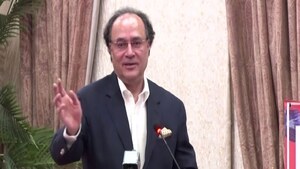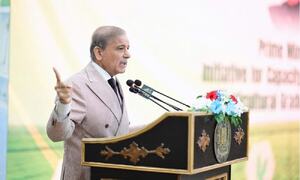Great Sindhi leader Allah Bux Soomro was born in 1900 in Shikarpur. In 1923, he was elected to the Jacobabad Municipal Committee. In 1931, he became the Chairman Sukkur District Local Board and Organised a conference of all District Local Board Presidents of Sindh, to enhance the role for the Local Governments. From 1926 to 1936, Soomro represented Upper Sindh in the Bombay Legislative Council.
He played an important role in initiating the Sukkur Barrage project, which revolutionised agriculture in Sindh. After the introduction of provincial autonomy in 1936, Shahnawaz Bhutto, Abdullah Haroon and Soomro founded the Ittehad (Unity) Party. The party won a resounding victory, capturing 24 of 35 Muslim seats in a house of 60.
On 23, March 1938, Soomro became the Premier of Sindh. During the two years of his first tenure, he insisted that his cabinet ministers would only draw low salaries and he withdrew magisterial powers from the influential landowners. He also ended nominations to Local Bodies, and brought back Obaidullah Sindhi, a leading revolutionary, who was in exile in Saudi Arabia.
When Soomro was returned to office, he continued his good works, keeping the best interests of Sindh in sight. When a flood threatened the city of Shikarpur, he diverted the waters to his own agricultural lands, saving the city from destruction. Soomro was famous for his simplicity and honesty. He always wore khadi and never used official flag on the car bonnet. He was awarded the title of Khan Bahadur. When he was the Premier, the viceroy nominated him to the Defence Council of 30 and he was given OBE (the Order of the British Empire).
In September 1942, in protest against prevalent British policies, he resigned from the Defence Council and relinquished all his titles. In his letter to the Viceroy, Soomro said that his actions were to express dissent against the forced entry of India into World War II, the repression of the Indian Freedom Movement and the overall British policy of 'divide and rule' that had led to communal clashes.
Soomro's courageous and nationalistic stance led to his removal from office by the British Governor on October 10, 1942, who declared he no longer had confidence in him- the assembly's confidence notwithstanding. Soomro was assassinated at 9am on May 14, 1943, by four assailants in Shikarpur. A man of principle, a great nationalist politician of India, a proponent of non-communal politics and a truly compassionate man was thus removed from this world, leaving a legacy of enduring accomplishments.
BR100
15,117
Increased By
58.7 (0.39%)
BR30
43,308
Increased By
377.1 (0.88%)
KSE100
149,210
Increased By
394.3 (0.26%)
KSE30
45,349
Increased By
142.3 (0.31%)





















Comments
Comments are closed.